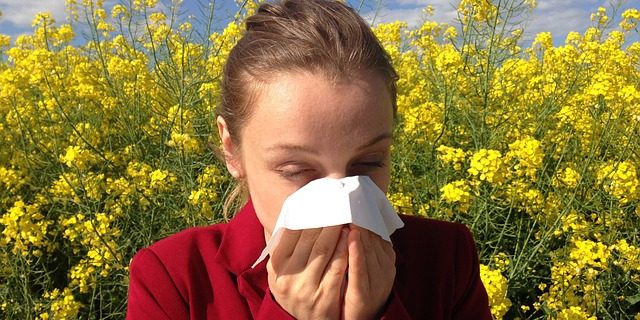I know climate change is a huge global issue; wildfires, floods, droughts, hurricanes, and tornados affect thousands and thousands of people. But today as I rub my itchy, bloodshot eyes, use my millionth tissue to wipe my dripping nose and cough so long and so hard that everyone nearby things I’m about to choke to death, I’m taking climate change quite personally!
Climate change occurs when long-term weather patterns are altered. By disrupting the atmospheric balance that keeps the climate stable, we are now seeing extreme effects around the globe.
The bottom line is we have released so much carbon dioxide and other greenhouse gases (GHG) that our planet’s atmosphere is now like a thick, heat-trapping blanket. As David Suzuki says, it’s like a thermostat that’s gone haywire. Want to learn more, check out the David Suzuki Foundation’s page on climate change
Climate change and allergies
Here’s a Global News story from last year: Allergy season getting longer in parts of Canada. Blame climate change, experts say.
That’s just great news!
Aeroallergens are pollen and spores in the air that cause allergic responses, most often allergic rhinitis (e.g. hay fever), asthma and eczema.
Research suggests that climate change will increase allergens in the air and related allergic reactions as warmer weather and milder winters will lead to increased pollen production. Higher carbon dioxide levels, due to climate change, can increase plant growth and pollen production.
A longer pollen season means higher pollen levels, longer allergy seasons; and greater exposure to aeroallergens.
What we can do about climate change
For all our sakes, whether you have allergies or not, here are 10 things you can do to help take care of the environment and tackle climate change.
- Take transit, ride your bike or use your feet – if you to commute to work, try carpooling
- Buy local food – it doesn’t have to travel so far to get your table which reduces the GHG emissions from transportation
- Forget plastic — bring your drinking water from home and take a reusable shopping bag to the grocery store
- Put your food scraps in the green bin (or if you have a garden, try composting)
- Adjust your thermostat, make it two degrees lower in winter or higher in the summer when you are away from home
- Do your laundry and run your dishwasher in off-peak hours
- Buy products with little or no packaging
- Remember this order – reduce, reuse and then recycle and think about new ways of using unwanted or old items.
- Clean with non-toxic products – try vinegar and water, cleans most surfaces and does wonders for your drains
- Take shorter showers, keeping them under five minutes can save up to 3,500 litres of water per month
How to help the allergies
If you have itchy eyes and a runny nose and it’s not a cold, here are some tips to beat seasonal allergies.







